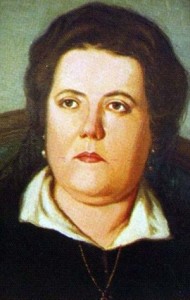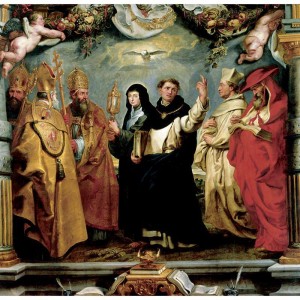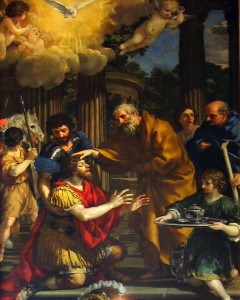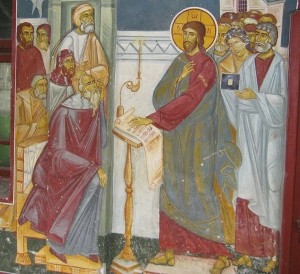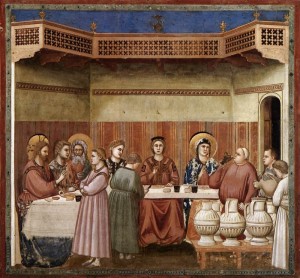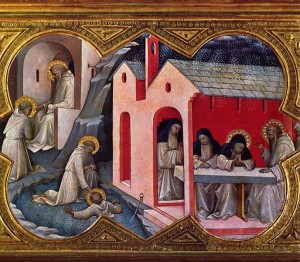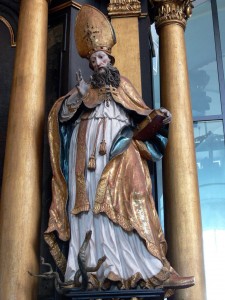 I think Hilary is a most fascinating saint given his humanity, the vigor of his intellect and the beauty of his lived faith. He is a convert at the age of 35. His first premise is the love of God and our response to the love. The incarnation of the Eternal Word of God, Jesus –love: God stooped down to us so that can reach up to touch Him.
I think Hilary is a most fascinating saint given his humanity, the vigor of his intellect and the beauty of his lived faith. He is a convert at the age of 35. His first premise is the love of God and our response to the love. The incarnation of the Eternal Word of God, Jesus –love: God stooped down to us so that can reach up to touch Him.
A skilled administrator and an exceptional priest Hilary paid for his single-mindedness in ecclesial matters and the teaching of the faith. After all, he was an apologist for Love.
A bridge between East and West, Saint Hilary fought Arianism and he introduced Eastern theology to the Western Church. Mother Church through the ministry of Pope Pius IX named Saint Hilary a Doctor of the Church in 1851.
What we believe to essential about a feast day or saint is found in the Mass prayers. Today, the Church prayed to God the Father that “we may rightly understand and truthfully profess the divinity of your Son.” So let’s be constant in this regard.
From a sermon on the Trinity by Saint Hilary:
May I serve you by making you known
I am well aware, almighty God and Father, that in my life I owe you a most particular duty. It is to make my every thought and word speak of you.
In fact, you have conferred on me this gift of speech, and it can yield no greater return than to be at your service. It is for making you known as Father, the Father of the only-begotten God, and preaching this to the world that knows you not and to the heretics who refuse to believe in you.
In this matter the declaration of my intention is only of limited value. For the rest, I need to pray for the gift of your help and your mercy. As we spread our sails of trusting faith and public avowal before you, fill them with the breath of your Spirit, to drive us on as we begin this course of proclaiming your truth. We have been promised, and he who made the promise is trustworthy: Ask, and it will be given to you; seek, and you will find; knock, and it will be opened to you.
Yes, in our poverty we will pray for our needs. We will study the sayings of your prophets and apostles with unflagging attention, and knock for admittance wherever the gift of understanding is safely kept. But yours it is, Lord, to grant our petitions, to be present when we seek you and to open when we knock.
There is an inertia in our nature that makes us dull; and in our attempt to penetrate your truth we are held within the bounds of ignorance by the weakness of our minds. Yet we do comprehend divine ideas by earnest attention to your teaching and by obedience to the faith which carries us beyond mere human apprehension.
So we trust in you to inspire the beginnings of this ambitious venture, to strengthen its progress, and to call us into a partnership in the spirit with the prophets and the apostles. To that end, may we grasp precisely what they meant to say, taking each word in its real and authentic sense. For we are about to say what they already have declared as part of the mystery of revelation: that you are the eternal God, the Father of the eternal, only-begotten God; that you are one and not born from another; and that the Lord Jesus is also one, born of you from all eternity. We must not proclaim a change in truth regarding the number of gods. We must not deny that he is begotten of you who are the one God; nor must we assert that he is other than the true God, born of you who are truly God the Father.
Impart to us, then, the meaning of the words of Scripture and the light to understand it, with reverence for the doctrine and confidence in its truth. Grant that we may express what we believe. Through the prophets and apostles we know about you, the one God the Father, and the one Lord Jesus Christ. May we have the grace, in the face of heretics who deny you, to honor you as God, who is not alone, and to proclaim this as truth.
 The Catholic Church in Korea is atypical because it was established and sustained by the laity. The missionary impulse of Catholicism was not a clergy enterprise but a lay one. This particular church faced persecution from day one. Today, we honor several of the lay martyrs who were beheaded on 31 January 1840 in Dangkogae, Seoul, Korea.
The Catholic Church in Korea is atypical because it was established and sustained by the laity. The missionary impulse of Catholicism was not a clergy enterprise but a lay one. This particular church faced persecution from day one. Today, we honor several of the lay martyrs who were beheaded on 31 January 1840 in Dangkogae, Seoul, Korea.